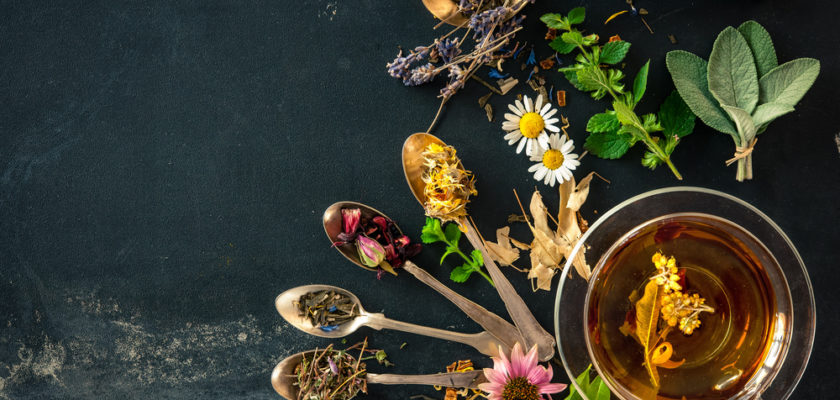Since 2737 BC in China, tea has been a part of people’s lives. It’s gained worldwide popularity due to its great taste and warming properties.
Due to its caffeine content, it can also give you a little boost when you need it. Communities within both the UK and around the world sometimes even drink up to 10 cups of tea a day!
So why drink herbal tea instead of the usual English Breakfast tea? Apart from a much wider range of tastes, herbal teas can contain a wide range of medicinal compounds.
Some herbal teas can work to treat mild stomachache or insomnia. Other’s can help calm a busy mind and have many other benefits.
Herbal teas can also contain a range of antioxidant and antibacterial properties. They can also contain extra vitamins and minerals.
This can be very useful if you’ve not been able to get enough vitamins and minerals from food during the day.
Tea is also a very versatile drink. You can have a cup with breakfast, dinner or on a cold day to warm you up. It’s always a good excuse to grab a cup of tea when catching up with a friend too. Also – if it’s sunny, iced tea is also a refreshing option!
Herbal teas come from different components of a plant. For example, some are formed from seeds, flowers, leaves, roots and sometimes bark.
Bear in mind not all types of herbs should be steeped in water. If you’re looking to experiment with different types of tea – be sure to research beforehand.
Whether you’re recovering from intense exercise or injury, herbal teas can speed up your recovery. Without further adieu – here’s 8 herbal teas that can help you recover!
Herbal Tea #1 – Stinging Nettle Tea
Great for: Anti-Inflammatory Properties

Stinging – nettle is commonly called nettle or nettle leaf. It is a herb from Europe, northern Africa, Asia and north America. It possesses plenty hollow stinging hairs that can work as hypodermic needles. These can produce a stinging sensation when touched by animals or people.
This stinging – nettle might sting you in the wild, but in tea it’s a different story. Once it is consumed as herbal tea, it can enhance your recovery.
Stinging nettle tea contains plenty of anti-inflammatory properties [1]. Reducing your inflammation can help your injuries recover faster.
Some reports rate stinging nettle as a treatment for eczema and reproductive issues. Though there are some areas stating these claims, more research is needed in this area [2]
Despite its bitter taste, you can add some honey to promote the scent and get away of the bitterness. Try a cup of stinging nettle tea for a few days and see how you feel!
Herbal Tea #2 – Milk Thistle Tea
Great for: Hangover Recovery
Milk thistle is a flowering herb which is similar to the daisy and ragweed families. When it’s crushed – milky white liquid runs off the plants leaves, which is where the plant get’s its name!
Milk thistle also contains silymarin and silybin. These 2 antioxidants are known to help support the liver. They can even help negate some of the negative effects of alcohol [3].
These compounds help block harmful toxins, reduce free radical damage. Milk thistle also has the same antioxidant power as grapes and red wine [4].
So if you’re feeling a bit rough after a weekend of drinking. Try a couple of cups of Milk thistle tea. You’ll be able to give your liver a helping hand in it’s recovery. As an extra bonus your body will be working to get you back into training ASAP.
Herbal Tea #3 – Ginger Tea
Great for: Digestive Issues
Ginger is a excellent spice and has a whole bunch of health benefits.
One reason ginger is often praised is for it’s stomach soothing properties. It’s particularly effective vs nausea, sickness and general digestive difficulties.
Ginger also has excellent anti-inflammatory properties helping the recovery process even more. It’s worth noting that ginger is also an alkaline compound. This can help your body from getting too acidic.
Tim Ferris’s Titanium Tea also features ginger as one of it’s key components. Try it with some coconut oil in the morning and see how you feel!
With a range of benefits, ginger also comes in a range of formats. You can use the root or spice powder in your cooking. Of course you can also make a cup of ginger tea to enjoy!
Herbal Tea #4 – Lemon Balm Tea
Great for: Beating Stress and Anxiety
Lemon balm is an herb that belongs to a mint family. It originates from the Mediterranean Basin, south-central Europe, Asia and Iran. Its leaves have a mild lemon flavor which is quite like mint.
Lemon balm is considered a calming herb. It’s been used as far back as the Middle Ages to reduce stress and promote sleep.
The research on lemon balm is isolation is light as it’s often studied as part of a mixture. One study did test the effects of a standardized lemon balm extract vs a placebo.
They found that the group consuming lemon balm has more desirable results. They had both increased mood and significantly increased calmness and alertness [5].
It’s anxiety reducing properties make it an excellent choice at bedtime. If you’re feeling agitated, it may be worth giving lemon balm tea a try.
Herbal Tea #5 – Peppermint Tea
Great for: Digestive Support and Anti-Inflammatory Properties
Peppermint tea is a very refreshing drink made with an infusion of peppermint. It’s got a whole bunch of health benefits – as well as being pretty tasty!
Peppermint tea is great for relaxing the digestive tract, helping to relieve blockages. It also helps promote proper bile flow. These can all help keep your digestive system in top condition. When your digestive system works at it’s best, you can absorb more nutrients from food!
Peppermint also has anti-inflammatory properties. This may be a reason it’s so popular in aromatherapy. Anti-inflammatory powers can be great at helping you recover from and reduce pain after injury.
If you want to make peppermint tea yourself – grab about 7 – 10 fresh peppermint leaves and crush them in your fingers. After you’ve rubbed the leaves in your hands for a moment add them to a cup. Boil a kettle, let it cool off for a few minutes then add to the leaves.
This will give you a natural, enjoyable peppermint tea. Leave the leaves inside the boiled water for 7-12 minutes – using the full 12 for maximum taste!
Herbal Tea #6 – Licorice Root Tea
Great for: Immune System Support

If you’re a fan of licorice sweets – you’re going to also love licorice tea. Licorice gets it’s name from an ancient Greek word meaning “sweet root”. It”s no wonder it’s also become a part of so many sweets in the world!
You may find it interesting that although licorice contains no sugar, it’s super sweet. This is because it contains glycyrrhizin – which is up to 50 times sweeter than sugar!
Apart from it’s taste, licorice tea has extra benefits which make it great for recovery.
It’s an easy drink which many people drink to ease digestive symptoms. Some of these include stomach ulcers, heartburn and gastritis. Added to this and licorice tea is also known for anti-inflammatory and immune support.
If you’ve got a bit of a sweet tooth, stock up one some licorice and start reaping the benefits.
Herbal Tea #7 – Chamomile Tea
Great for: A restful nights sleep

Chamomile is a herb that comes from the daisy family. It’s a popular ingredient for teas and has a special compound called bisabolol.
Bisabolol has significant anti-inflammatory properties. It’s also a part of many skin supporting products on the market.
Chamomile is most popular for it’s calming properties and is often used by people around the world to help with sleep.
If you’re having difficulty sleeping at a regular time, try this. Pour a cup of chamomile tea about 45 minutes before bed. Turn off all electronic devices and meditate for 10 minutes.
Make sure your room is dark, quiet and at a comfortable temperature. Try reading a favorite book whilst you settle into the bedroom. By now the calming properties of chamomile should have set your body up for a super relaxing sleep. Goodnight!
Herbal Tea #8 – Titanium Tea (Tim Ferriss)
Great for: Productivity and Well-being
The last special tea within this article is one you may not have heard about before.
Created by Tim Ferris, Titanium Tea is more of a mixture than a standalone tea. Despite this, it’s excellent for both wellbeing, recovery and even productivity.
Titanium Tea is a different morning drink to the popular Bulletproof Coffee. It’s also featured in-depth in Tim Ferriss’s latest book: Tools of Titans. The tea contains black tea (ideally Pu-Erh tea), green tea (Kabuse Sencha Green Tea), Yerba Mate, Butter, and Coconut oil:
- 2 Tablespoon Pu-Erh Tea
- 1 Tablespoon Kabuse Sencha Green Tea
- 1 Tablespoon Yerba Mate
- 1 Tablespoon Butter from Grass-Fed Cows (e.g. Kerrygold)
- 1 Tablespoon Coconut Oil
- For an added bonus – sprinkle in half a teaspoon of turmeric and half a teaspoon of ginger.
Part of the magic that comes from titanium tea comes from how it’s ingredients work together.
Focusing on the tea element first – green tea and black tea’s effects have different half-lives. A biological half-life is how fast the effect of a compound is reduced to half in the body.
This is just a fancy way of stating that green and black tea have different caffeine peaks and rates of slowdown.
This means that you won’t experience the same “high then crash” effect that you may get from coffee. The more sustained effect of this caffeine can help you feel productive for longer.
As Titanium Tea contains turmeric and ginger- you can get all the benefits of ginger tea AND turmeric as a bonus. Turmeric has similar benefits to ginger as it has great anti-inflammatory properties. It also is very alkaline which can stop the body absorbing nutrients from bone tissue.
The benefits of coconut oil are plenty. It can support your recovery apart from being anti-inflammation. Two ways in which it does this are through improving digestion and supporting healthy hormone production.
Put all these ingredients together into a single cup and you’ll be preparing your body to function at it’s peak for hours!
Conclusion
There’s so much that teas can offer when you need to recover more effectively. We hope this list gives you a great start into trying some new teas that you’ve never tried before.
Which tea is your favorite?
Know someone who loves tea? Then why not share this post on Facebook!
References:
[1] Lipophilic stinging nettle extracts possess potent anti-inflammatory activity, are non cytotoxic and may be superior to traditional tinctures for treating inflammatory disorders – https://www.ncbi.nlm.nih.gov/pubmed/23092723[2] 5 Proven, Remarkable Stinging Nettle Benefits – https://draxe.com/stinging-nettle/
[3] Protective effects of silymarin, a milk thistle (Silybium marianum) derivative on ethanol-induced oxidative stress in the liver – https://www.ncbi.nlm.nih.gov/pubmed/17133738
[4] Milk Thistle – http://www.liversupport.com/milkthistle.htm
[5] Lemon Balm – http://www.umm.edu/health/medical/altmed/herb/lemon-balm

